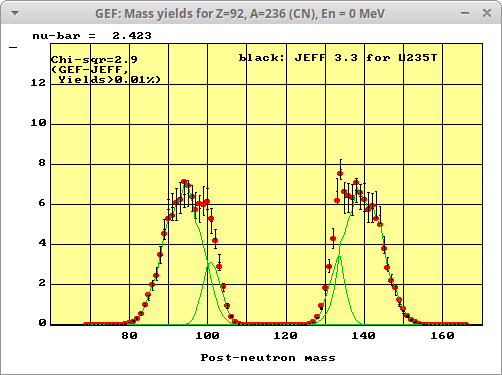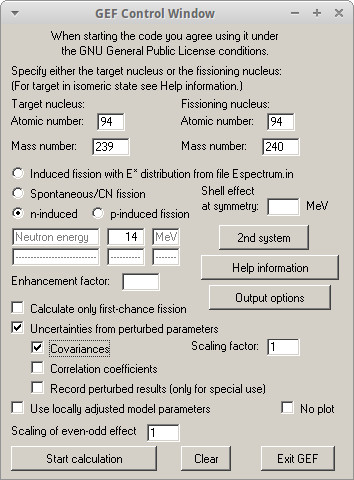GEF 2023/3.3
General
description of fission observables,
released on August 2, 2024.
Short characterisation of
GEF 2023/3.3:
Compared to GEF 2023/3.2, the following modification have been
applied:
-
For a better reproduction of fast-neutron-induced fission of 238U, the
peak at Z = 50 in the contribution of the proton shell to the standard
1 fission mode was flattended.
- The onset of the suppression of the standard 1 fission mode was
smeared out.
-
A small deformation of the heavy fragment in the standard 1 fission
mode due to the neck was introduced and adjusted to reproduce the
prompt-neutron multiplicities of 235U(nth,f) and 252Cf(sf).
- The transition in the level density from const. temp. to Fermi-gas in
EVI was corrected.
The mass distribution of 235U(nth,f) from GEF-2019/1.1
(red
points) in
comparison with the JEFF 3.3 evalution (black symbols with error
bars). The calculated contributions from different
fission channels are traced in green. 10 million events have been
calculated.
,
We
are happy about any feed-back (mail to
schmidt-erzhausen<at>t_online.de). This helps to correct
errors,
to improve the quality of the model and to better respond to the needs
and preferences of the users.
Use of the GEF code is subject to the GNU GENERAL PUBLIC LICENSE
agreement that you find here: <License>.
Stand-alone version (Monte-Carlo method)
The
stand-alone version of the GEF code is written in FreeBASIC (a). The
FreeBASIC compiler produces binary code from the same source on Windows
(b) and on Linux. The executable uses the C library.
For
the Windows
version, a GUI is provided, written in JustBasic (c). The Windows
version runs also on Linux with Wine (d). The Windows version
runs also on OS X (e)
with Wine (d).
a) FreeBASIC is available from http://www.freebasic.net/
with no
cost.
b) Windows is either a registered trademark or a trademark of Microsoft
Corporation in the United States and/or other countries.
c) JustBasic is available from http://www.justbasic.com/ with no cost.
d) Wine is a windows compatibility layer for Linux and Mac OS X
(http://www.winehq.org/).
e) OS X is a trademark of Apple Inc., registered in the U.S. and other
countries.
Quick start on Windows:
- Download the binaries
(that includes some additional files).
- Start GEF.bat
in a
command window.
- Fill in the input mask of the graphical user interface and
start
the calculation.
- Output is written to file \out\...
.dat.
Quick start on Linux:,
- Download the binaries.
- Version
with nuclear properties from JEFF-3.3 (32-bit/64-bit),
considers only
long-lived isomers.
- Version
with nuclear properties from NUBASE2016 (32-bit/64-bit),
considers all known
isomers.
- Make sure that the binary file GEF is executable.
- Enter ./GEF32
or ./GEF64
in a command
window.
- Answer the input dialogue.
- Output is written to file
/out/... .dat.
Remark: The problem with the 64-bit compiler that had been mentioned on this place is solved.
Windows version
Input mask
of the graphical
user interface:
For Windows and Linux
Complete
package
Documentation
Readme
file
(Technical information, list of relevant publications)
JEFF-Report
24, part I
(Comprehensive documentation of the GEF model.)
JEFF-Report
24, part II
(Technical information on the GEF code.)
Source (for Windows and Linux)
Source
files
An extended version of GEF-2023/3.3 that
includes delayed processes (output of delayed-neutron multiplicities,
delayed-neutron emitters, cumulative fission-fragment yields in ENDF
format) is available here.
It
provides
also an
option for producing random files of fission-fragment yields in ENDF
format.
List-mode file (example)
(short sample of most complete event list)
Raw data for the multi-variate distribution of fission-fragment yields
from calculations with perturbed parameters (example)
See Readme
file
for more detailed information.
You
may consider using the Windows version of GEF on Linux with Wine in
order to profit from the more comfortable input handling offered by the
graphical user interface. This option may also solve problems of
missing libraries under Linux.
Subroutine (Folding method)
The subroutine aims for being used
in combination with other nuclear-reaction codes. For a given
fissioning nucleus with excitation energy E* and angular
momentum I
it calculates complete distributions of a number of fission observables
before emission of prompt neutrons and prompt gamma radiation with the
GEF model.
Documentation
Technical description of the subroutine
FreeBASIC version
In preparation
FORTRAN version
In preparation
Additional data
List
of fission barriers


